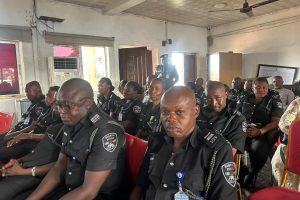Amid speculations that the ruling All Progressives Congress may collapse after the exit of the President, Major General Muhammadu Buhari (retd.) in 2023, the Governor of Yobe State, Mai Mala Buni, has said the much speculated presidential ambitions of Governor Nasir el-Rufai of Kaduna State and that of the National Leader of the All Progressives Congress, Asiwaju Bola Tinubu, cannot break the party.
Speaking in an interview on the Hausa Service of the British Broadcasting Corporation, which was monitored by one of our correspondents in Kaduna on Saturday, the governor, who also rejected rotational presidency, said their ambitions would rather strengthen the party given the solid foundation, which he said the President had laid through his performance in office.
There had been mounting tension over which zone would produce the next President in the 2023 elections.
A leader of the party in the South-East region and a two-time governor of Imo State, Senator Rochas Okorocha, had first raised the alarm in September 2019 when he said the APC might crumble after Buhari’s exit from office. He, therefore, called for the overhauling of the party leadership to avert it.
Speaking with journalists in Abuja after the elections petitions tribunal affirmed his victory as the winner of the senatorial election in Imo West Senatorial District, Okorocha said, “I have never thought of leaving the party; I feel that time will take care of most things but my only worry is that the party may disappear with the exit of President Buhari.”
Also, the Chairman of the Nigerian Governors’ Forum and Governor of Ekiti State, Dr Kayode Fayemi, had in January said the ruling party might cease to exist at the end of Buhari’s tenure.
Fayemi, who is also a founding member and a leader of the ruling party, told Daily Trust, “If we are not careful; if we do not institutionalise processes and procedures in the party and make it more inclusive than it is, we will not have a party when President Muhammadu Buhari leaves government. This is because he is the unifying force of our party.”
But in his response, Governor Abubakar Badaru of Jigawa State, who is also of the APC, disagreed with Fayemi on his position, stating that the President had promised to support the party and make sure it gets stronger even after leaving office.
He had said, “On the survival of the APC after President Buhari, President Buhari made a commitment to the governors that he would support us in anyway to make sure that the party survives and waxes stronger even after him.”
But speaking with BBC on Saturday, the Yobe governor, who is a former National Secretary of the party, noted that with the solid foundation being laid by the President, the ambitions of the two party members ahead of the 2023 Presidency, won’t tear the party apart.
Buni said, “The ambitions of el-Rufai and Tinubu will further strengthen the party. This is because Buhari has laid a solid foundation in the party through his good governance.
“I don’t think their ambition will affect the party. You should know that for now, there is no party in Nigeria that is as formidable as the APC. The APC also controls more states than the other political parties.”
Neither Tinubu nor el-Rufai had expressed their intention to contest the presidency in 2023.
But, earlier in the year, Tinubu had while speaking to State House Correspondents after visiting Buhari for a brief meeting on January 7, 2020, stated that it was too early to talk about which section of the country would get the presidential slot for 2023. “It will be mere restlessness to talk about it now; this is not the time,” he said.
…rejects rotational presidency
Buni also kicked against the idea of rotational presidency, which implied that power should move to another geo-political zone when Buhari, a northerner, leaves office in 2023 after serving for the two terms allowed by the constitution.
Buni explained that ‘rotation’ limits the chance of people to make choices of who should occupy the coveted seat.
He said, “People should be allowed to choose their President from any part of Nigeria. It’s not written anywhere that the President must come from a particular region. It was not even in any established order.”
The governor also dismissed insinuations that his government was dominated by associates of his predecessor who would not allow him to concentrate and work for the people of the state.
On the N30,000 new minimum wage, the governor said the state had since commenced the payment even with its meagre resources. He also expressed concern over the large number of out-of-school children in the state as a result of Boko Haram insurgency in the North-East region. Insurgency had been witnessed largely in Yobe, Adamawa and Borno states.
“Boko Haram conflict started when these children were about three years old; now it’s about 10 years (that the problem started) and they (the kids) have not been in school,” he added.
On the issue of rotational presidency, el-Rufai had in a prologue titled, ‘Defeating a Determined Incumbent – The Nigerian Experience’, which he contributed to a book – Power of Possibilities and Politics of Change in Nigeria – written by the Director-General of the Progressives Governors’ Forum, Salihu Lukman, also made a case for the abandonment of zoning arrangement for political offices in the country.
He said the arrangement needed to be de-emphasised and ultimately abandoned in favour of competence, while describing the zoning of political offices as a barrier to political equality.
Notably, though an informal arrangement, the position of the President currently rotates between the North and the South, since the country returned to democracy in 1999.
He said, “Even with our success in the 2015 elections, there is room for improvement. Barriers to political equality, such as our seemingly entrenched though informal rule for zoning candidacies according to regions of origin, need to be de-emphasised and ultimately abandoned in favour of an emphasis on qualification, competence and character.
A federal lawmaker in the second republic had said no law says power must return to the south.
But in their response, prominent leaders of the South-West, South-South and South-East said it would only be right for power to return to the South, especially the South-East.









Add Comment